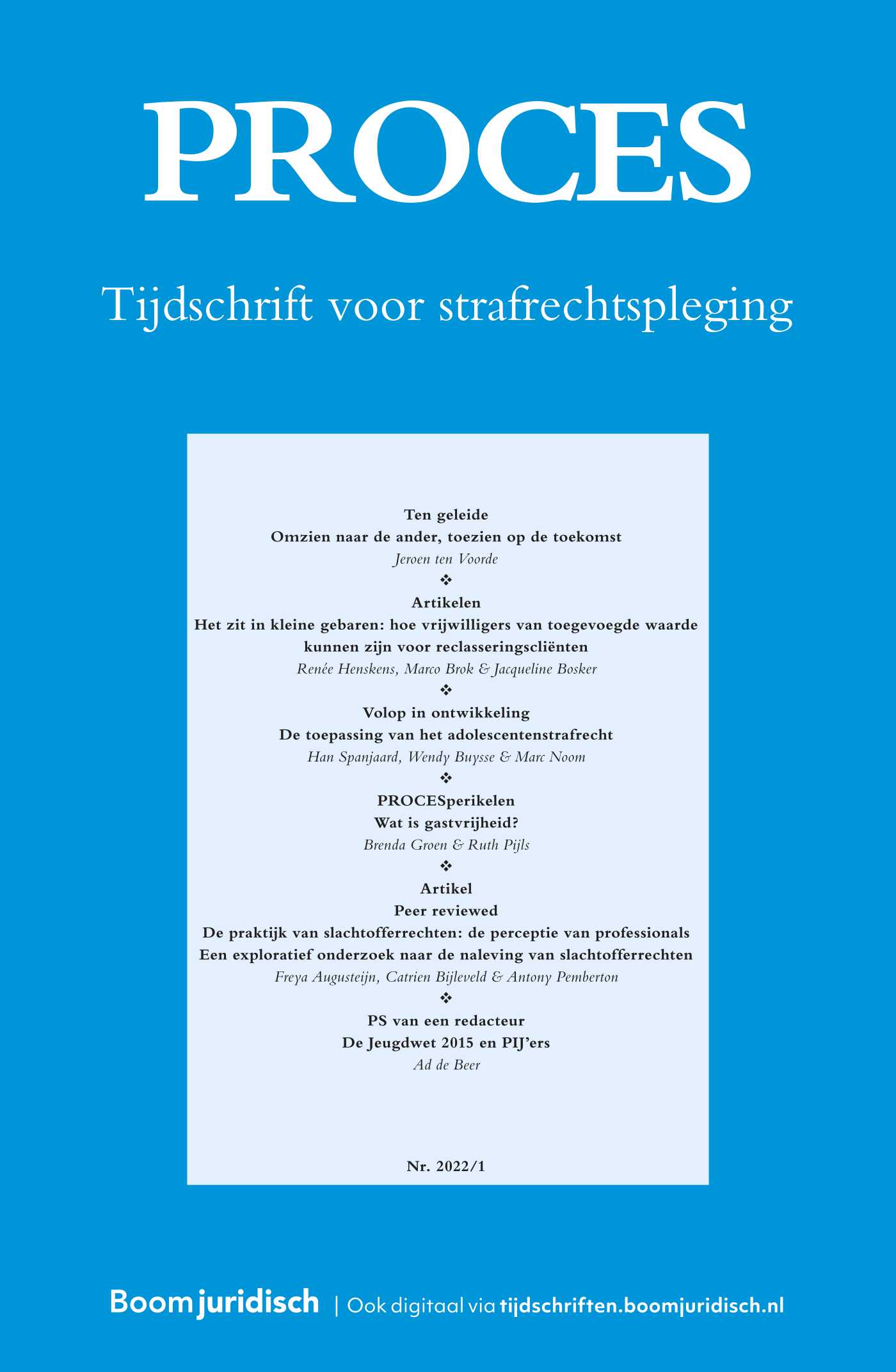|
Criminological research has consistently shown that first and second generation migrants are overrepresented in official crime rates compared to native populations. To date, insight into the development and explanation of this overrepresentation in official crimes rates over time is lacking, due to which the relationship between integration of migrants and criminal behavior remains underexplored. The current study uses CBS-data to create insight into the development and explanation of differences in demographic (such as age) and socio-economic characteristics (such as relationship status and income). Results show (1) that there are clear differences in the probability of being convicted between migrant groups, (2) that these differences can largely be explained by differences in demographic and socio-economic characteristics, and (3) that differences in the probability of being convicted as well as the studied characteristics are largely stable over time. |


PROCES
Meer op het gebied van Criminologie en veiligheid
Over dit tijdschriftMeld u zich hier aan voor de attendering op dit tijdschrift zodat u direct een mail ontvangt als er een nieuw digitaal nummer is verschenen en u de artikelen online kunt lezen.
| Ten geleide |
‘Psychisch geweld’: een verwarrend begrip |
| Auteurs | Robert Timmers |
| Auteursinformatie |
| Peer reviewed |
|
| Trefwoorden | migrantengroepen, strafrechtelijke veroordeling, demografische en sociaaleconomische kenmerken |
| Auteurs | Babette van Hazebroek en Paul Nieuwbeerta |
| SamenvattingAuteursinformatie |
| PROCESperikelen |
Veelzijdige identiteiten dragen bij aan diversiteit, inclusie en veiligheid |
| Auteurs | Youssef Azghari |
| Auteursinformatie |
| Artikel |
Opvang en ondersteuning voor slachtoffers van huiselijk geweld én hun huisdieren in Nederland |
| Trefwoorden | huiselijk geweld, dierenmishandeling, cruelty link |
| Auteurs | Leonie Bakker, Rianne Haaijema en Janine Janssen |
| SamenvattingAuteursinformatie |
|
The purpose of this study was to explore the supposed link between domestic violence and animal abuse, and the Dutch situation with regard to help and support for victims and their pets. We aimed to answer the following research question: What are the current limitations in support and care for victims of domestic violence and their pets in the Netherlands? To this end, we conducted a literature study and analysed registrations of the Dutch organization Mendoo. Our findings confirm the existence of this link and the need for an integrated approach. Registrations of Mendoo show that in 2023 only 11 of the 35 Dutch shelters for victims are accessible for companion animals. The most common reason for this is the lack of structural financial resources. |
| Artikel |
Toegang tot transgenderzorgEen overzicht van de jurisprudentie omtrent geslachtsaanpassende behandelingen |
| Trefwoorden | transgenderzorg, jurisprudentie-overzicht, toegang tot zorg, passabiliteit |
| Auteurs | Noor Swart en Brigit Toebes |
| SamenvattingAuteursinformatie |
|
Transgender care in the Netherlands is under a magnifying glass. Among other matters, there are complaints about the long waiting times for gender reassignment treatments, the aftercare and the reimbursement of care. Transgender care is crucial for the health, well-being, and physical integrity of the individual. In this article, authors focus on the accessibility of transgender care, by providing an overview of the case law on gender reassignment treatments (until the end of 2023). The analysis investigates Dutch case law, judgments of the Netherlands Institute for Human Rights and judgments of the European Court of Human Rights. The overview serves as a starting point for further research in this area. |
| Artikel |
De overlap tussen offline en online geweld in afhankelijkheidsrelatiesNaar een typologie voor professionals |
| Trefwoorden | online geweld, professionals, cybercriminaliteit, geweld in afhankelijkheidsrelaties |
| Auteurs | Susanne van ’t Hoff-de Goede en Janine Janssen |
| SamenvattingAuteursinformatie |
|
Our lives are taking place online more and more. This development has had consequences for our relationships and the violence that can occur in these relationships. Yet academics and professionals often assume that there is a distinction between violence in dependency relationships and online crime. In practice, the overlap between offline and online behavior is not always properly recognized. In this article, the overlap between offline and online aspects of violence in dependency relationships is made clear on the basis of a typology, in which four types are distinguished: offender and victim have met each other offline and the violence takes place completely offline (type 1) or online with or without a combination with offline violence (type 2) or offender and victim have met each other online and the violence takes place offline with or without a combination with online violence (type 3) or completely online (type 4). With this typology, we also aim to make it clear to professionals in the field of violence in dependency relationships and cybercrime that they need each other and that cooperation is essential. |
| PS van een redacteur |
Dader en slachtoffer: een paar apart? |
| Auteurs | Jaap A. van Vliet |
| Auteursinformatie |

